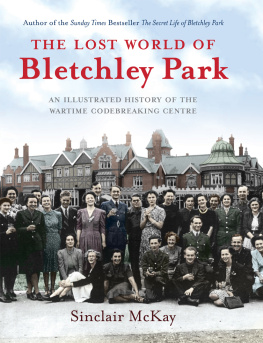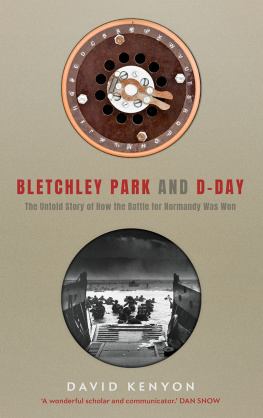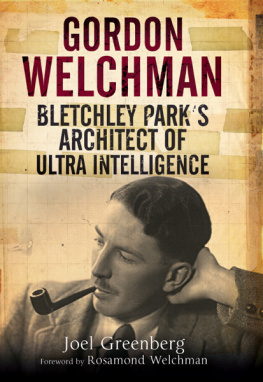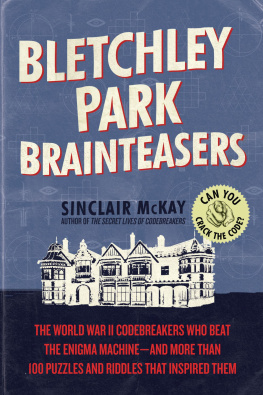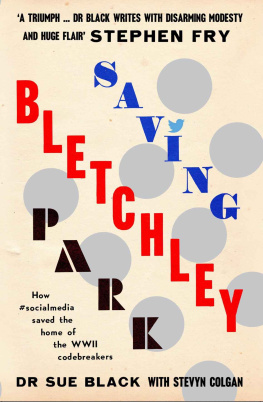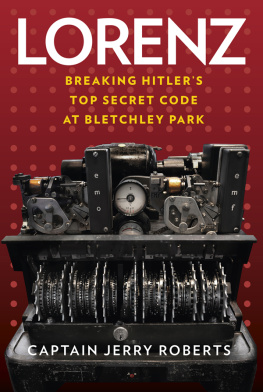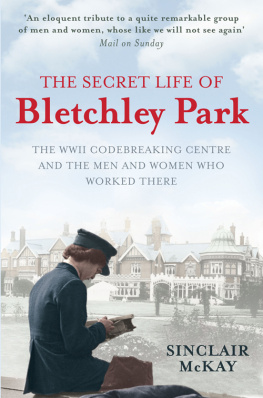CONTENTS
1. Bletchley Park in Pre-War Perspective
Christopher Andrew
2. The Government Code and Cypher School and the First Cold War
Michael Smith
3. Reminiscences on the Enigma
Hugh Foss
4. Breaking Air Force and Army Enigma
Ralph Erskine
5. Hut 6 From the Inside
Derek Taunt
6. Breaking Italian Naval Enigma
Mavis Batey
7. A Biographical Fragment: 19425
John Chadwick
8. An Undervalued Effort: How the British Broke Japans Codes
Michael Smith
9. Solving JN-25 at Bletchley Park: 19435
Edward Simpson
10. Most Helpful and Co-operative: GC&CS and the Development of American Diplomatic Cryptanalysis, 19412
David Alvarez
11. Breaking German Naval Enigma on Both Sides of the Atlantic
Ralph Erskine
12. Hut 8 From the Inside
Rolf Noskwith
13. Bletchley Park and the Birth of the Very Special Relationship
Stephen Budiansky
14. Mihailovi or Tito? How the Codebreakers Helped Churchill Choose
John Cripps
15. Traffic Analysis: A Log-readers Tale
James W. Thirsk
16. Bletchley Park, Double Cross and D-Day
Michael Smith
17. How Dilly Knox And His Girls Broke
the Abwehr Enigma
Keith Batey
18. Breaking Tunny and the Birth of Colossus
Shaun Wylie
19. Colossus and the Dawning of the Computer Age
B. Jack Copeland
20. Enigmas Security: What the Germans Really Knew
Ralph Erskine
21. From Amateurs to Professionals: GC&CS and Institution-Building in Signals Intelligence
Philip H. J. Davies
22. Cold War Codebreaking and Beyond: the Legacy of Bletchley Park
Richard J. Aldrich
23. Bletchley Park in Post-War Perspective
Christopher Andrew
ACKNOWLEDGEMENTS
The editors are grateful to the contributors for so readily agreeing to donate their work to the Bletchley Park Trust (which is a registered charity), and for meeting a very demanding timetable without complaint.
Ralph Erskine is indebted to his wife, Joan, for her forbearance when he is engrossed in Sigint history, especially during the editing of this book. Michael Smith would like to thank his wife, Hayley, and his family for their patience. The editors found the project a rewarding one, and hope that readers will enjoy the result.
On 21 October 1941, four of the leading codebreakers at Bletchley Park wrote to the Prime Minister, Winston Churchill:
Secret and Confidential
Prime Minister only
Hut 6 and Hut 8,
(Bletchley Park) 21st October 1941
Dear Prime Minister,
Some weeks ago you paid us the honour of a visit, and we believe that you regard our work as important. You will have seen that, thanks largely to the energy and foresight of Commander Travis, we have been well supplied with the bombes for the breaking of the German Enigma codes. We think, however, that you ought to know that this work is being held up, and in some cases is not being done at all, principally because we cannot get sufficient staff to deal with it. Our reason for writing to you direct is that for months we have done everything that we possibly can through the normal channels, and that we despair of any early improvement without your intervention. No doubt in the long run these particular requirements will be met, but meanwhile still more precious months will have been wasted, and as our needs are continually expanding we see little hope of ever being adequately staffed.
We realize that there is a tremendous demand for labour of all kinds and that its allocation is a matter of priorities. The trouble to our mind is that as we are a very small section with numerically trivial requirements it is very difficult to bring home to the authorities finally responsible either the importance of what is done here or the urgent necessity of dealing promptly with our requests. At the same time we find it hard to believe that it is really impossible to produce quickly the additional staff that we need, even if this meant interfering with the normal machinery of allocations.
We do not wish to burden you with a detailed list of our difficulties, but the following are the bottlenecks which are causing us the most acute anxiety.
1. Breaking of Naval Enigma (Hut 8)
Owing to shortage of staff and the overworking of his present team the Hollerith section here under Mr Freeborn has had to stop working night shifts. The effect of this is that the finding of the naval keys is being delayed at least twelve hours every day. In order to enable him to start night shifts again Freeborn needs immediately about twenty more untrained Grade III women clerks. To put himself in a really adequate position to deal with any likely demands he will want a good many more.
A further serious danger now threatening us is that some of the skilled male staff, both with the British Tabulating Company at Letchworth and in Freeborns section here, who have so far been exempt from military service, are now liable to be called up.
2. Military and Air Force Enigma (Hut 6)
We are intercepting quite a substantial proportion of wireless traffic in the Middle East which cannot be picked up by our intercepting stations here. This contains among other things a good deal of new Light Blue intelligence. Owing to shortage of trained typists, however, and the fatigue of our present decoding staff, we cannot get all this traffic decoded. This has been the state of affairs since May. Yet all that we need to put matters right is about twenty trained typists.
3. Bombe testing. Hut 6 and Hut 8
In July we were promised that the testing of the stories produced by the bombes would be taken over by the WRNS in the bombe hut and that sufficient WRNS would be provided for this purpose. It is now late in October and nothing has been done. We do not wish to stress this so strongly as the two preceding points, because it has not actually delayed us in delivering the goods. It has, however, meant that staff in Huts 6 and 8 who are needed for other jobs have had to do the testing themselves. We cannot help feeling that with a Service matter of this kind it should have been possible to detail a body of WRNS for this purpose, if sufficiently urgent instructions had been sent to the right quarters.
4. Apart altogether from staff matters, there are a number of other directions in which it seems to us that we have met with unnecessary impediments. It would take too long to set these out in full, and we realize that some of the matters involved are controversial. The cumulative effect, however, has been to drive us to the conviction that the importance of the work is not being impressed with sufficient force upon those outside authorities with whom we have to deal.



